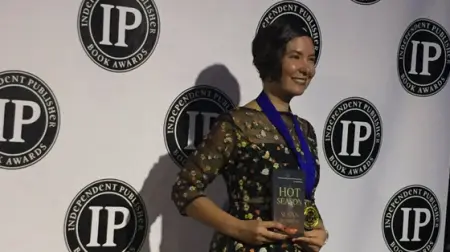Image via Unsplash
Last month, dear reader, I shared 10 Mistakes I Made as a Debut Novelist, to spare you from doing the same.
But as it turns out, there were a lot of things I did right as well—and now, six months after my novel launched, it's clear to me what those things were. Or, to put it another way: It's clear to me now which of the things I did—out of the bizilions of things that debut authors are told we absolutely have to—actually made a difference.
1. Build a Great Website—and Maintain It
If you've got a book coming out, it stands to reason that you need a website, and publishing guru Jane Friedman makes a solid case that if you want to launch a career as a writer—rather than a single book—you need an author website (preferably yourname.com) rather than a website for your book.
I took that advice seriously, and I'm also enough of a marketing geek that I wanted something that both looked really cool and was easy to update. So six months before Hot Season launched, I spent a maddening number of hours learning how to work with a flexible, design-savvy theme for Wordpress, while many of my peers threw up a Wix or Weebly and called it good.
Many of my peers also seemed to forget about their website once it was up, while I kept adding to and tinkering with mine, adding each new review/interview/podcast as it came in, each new publishing credit, and videos/audio of events, classes I've taught, upcoming events, etc. (Just the time I've spent troubleshooting my mailing list pop-up is, frankly, embarrassing to admit.) I also built my site to be super friendly to journalists working with tight deadlines, because guess what, I used to be one.
Clearly, I'm the sort who feels an irrational compulsion to Do All the Things, so I honestly wasn't all that sure if this time could be considered justified, in terms of ROI. But then, five months after my book came out, I was included on a list of "25 Oregon Authors Every Oregonian Must Read" by the state's largest newspaper. This list includes heavy hitters like Ursula K. Le Guin, Chuck Pahlaniuk, and Cheryl Strayed—people WAY above my pay-grade. In fact, I may be the only debut author who was included.
Of course I was hugely flattered. But some part of me kept wondering why—why, when so many of my peers had bigger books, bigger deals, bigger names, or were way more Oregon in so many ways (Monica Drake and Jamie Duclos-Yourdon are two that come to mind). But as I reread that write-up, I began to see that though the blurb went into my backstory and work in some depth, there was nothing in it that did not clearly originate with—you guessed it—my website.
Yes, the author of this article must have read my book and liked it, and maybe he was looking for someone younger, female, brown-ish, newish, debutish—who knows? What I do know is this: I made it easy to write about me without a whole lot of help from Google, and in the end, it made a difference.
![]() 2. Make Friends
2. Make Friends
Before it launched, Hot Season was included in a article on Read It Forward entitled "Auspicious Beginnings: 7 Excellent, (Mostly) Recent Debuts." Taylor Larsen's debut—Stranger, Father, Beloved—was also included on this list, and Taylor, being a hugely kind and generous person, reached out to me on my pub day to congratulate me.
I was so touched by this that I immediately bought her book, and over the course of the next few months, we become online author buddies. Over Christmas, we did a book bundle giveaway together; I've boosted her signal and she's boosted mine. Now we're working on setting up a joint reading for her in Portland, Oregon, where I live, and Taylor has set up a joint reading for us in Brooklyn while I'm in New York for BEA.
In fact, she's my date tonight for the IPPY Awards banquet ceremony, where I'll be accepting the award for Best Fiction of the Mountain West. How cool is that?
To those who consider other authors their competition, I say, chill. You may feel competitive as an aspiring author, and that sense of competition may sharpen you in some ways—but ultimately, we're all in this together. Making friends with other authors, and helping them in any way you can, is one of the best things you can possibly do.
3. Ask for What You Need
When I went to AWP last year, I knew if my small press debut was going to achieve even a moderate degree of success, I was going to need all the help I could get. Toward that end, I made some rather bold requests of anyone and everyone I knew who was in the business of reviewing books.
One of those people was my old MFA buddy Josh Cook—who let me know, graciously enough, that, uh, reviewing books by people you know is sometimes, well, frowned upon. I apologized for being a noob, and we went on chatting along the lines of our mutual geekery, which of course is why we hit it off in grad school to begin with.
At the same time, though, I'd made it clear that I needed help—a fact which may seem obvious to you, as an author with an approaching pub date, but is not always clear to others. After all, you're the successful one, right? You got a book deal.
But a book deal with a small press has a high likelihood of going absolutely nowhere without a whole lot of hustle behind it, so I made it a point, at every step along the way, to make it clear what I needed from people, whether it was an Amazon/Goodreads review, a signal boost, or, yes, a review.
Nearly a year later, Josh wrote to let me know he'd pitched The Rumpus on a mini-interview. Was I interested?
Of course I was. Now the mutual geekery of our conversation—about my book, the universe, and everything—resides on one my favorite literary websites—where, hopefully, it will bring Hot Season to the attention of many more geeks very much like us.
4. Be Gracious
When I sent a review copy of my novel to The Oregonian two or three months before my book launched, I did so in hopes of a review. That didn't happen, though the arts editor did note the date of my book launch at Powell's, with a few lines from the back of the book, including the press photos I'd sent along.
Which was great, of course—but it wasn't a review.
At this point, I was desperate for a review from an established newspaper—which are, by all accounts, somewhat of an endangered species. But though I groused to myself about the expense of having sent an actual printed ARC, which may not even have actually been read, I still dropped an email to thank this editor for the coverage.
Six or so months later, see item #1 above—clearly, that ARC got passed along to another writer, and this one not only read it, he wound up setting a place for me at the The Big Kids Table. It goes to show, you just never know—so you might as well be gracious when things don't work out exactly as planned.

5. Toot Your Own Horn
Remember that awesome list I got named to? The "Auspicious Beginnings" article? The Rumpus Mini-Interview? I'm mentioning them again because nobody remembers these things unless they see them more than once.
That's why friends and fans online who will boost the signal of your good news are so important. But even those people are unlikely to even see your good news if you don't post about it more than once. That's why I tend to find a number of different ways to post my news when it comes—through Instagram, Twitter, blog posts, and FB posts too (each, hopefully presenting a slightly different angle), and the ICYMI's too.
There are authors who find this sort of thing demeaning, and for sure, we've all seen authors who practically beat their followers over the head with the hard sell on their book, which quickly becomes distasteful. But if I genuinely have some good news—news that has made me happy, that is meaningful to me as an author and person—chances are, there are people who want to know about it, and by making that easy for them, I've received a lot of support.
6. Send Out to Contests
Book tours cost money, publicists cost money, ARCs cost money—and unbeknownst to many first-time authors, sending a book out for consideration by contests costs money too. If you're publishing with a small press, this expense—like so many others typically handled by the larger publishing houses—may also fall to you.
At this point, you may have spent money on all of these other things, so you may feel it's time to stop the bleeding and move on. But if your book is going to get any kind of boost six months or more after it's pubbed, chances are, it's going to be because it won an award.
That was certainly the case for me, as I've seen a surge of interest in Hot Season since I shared the news that it won a 2017 Gold IPPY Award—and this week, I'll have the opportunity to share that news with all sorts of bookish people converging on New York for Book Expo America.
Awards don't typically lead to huge sales, but in terms of launching a career and boosting visibility for your debut, winning even a little one can be a big deal.
7. Do Events
Book events can take a lot of energy, and for authors who are introverts, they can be a real challenge. But in my experience, one event always leads to another, just as one personal connection always leads to another.
Especially after the initial buzz about your book has died down, the thing that will most likely drive someone to buy your book is the fact that they've met you—so to my mind, it's always worth it to do a book event at a library in a small town, to appear at a conference, to read to even five or six people in a little neighborhood bookstore.
And sometimes those little things can wind up being really fun—like, say, the time I presented to just a few people at a library on the Oregon coast, but wound up getting put up for the evening in a lovely, literary-themed seaside hotel. (By the way, my bartender that evening bought my book.)
8. Interview Your (S)Heroes
I'm a big believer in literary citizenship, and after the buzz about your own book dies down, I think it's important to return to the work of promoting those whose books you care about in any way that you can. After all, none of us got here on our own, and we owe everything to our influences—and what, after all, have we been asking others to do for us during our moment in the sun with our own books?
One of the things I did right, early on, was to ask one of my literary heroes if I could interview her while I was in Tucson on book tour. I'd reached out to her for a blurb on my book, which I knew was a long shot—and though she turned me down, she was so nice about it that I asked if I could interview her on spec (see "Shameless: 10 Guerrila Tactics for Promoting Your Debut Novel.")
A few weeks back, I received word that The Writer's Chronicle had accepted that interview for publication—which will be both a nice byline and a nice place to get my name and the name of my book seen (especially in conjunction with someone I hugely admire). At this point, this author, one of my (s)heroes, has also become a good friend. That's a huge bonus, in my book.
10. Keep Hustling
Finally, while many of my peers with first books that launched around the same time as mine have stopped talking about their book—and looking for new opportunities to promote it—I've kept hustling, via events, mailings, and media pitches/engagements. Granted, much of this has been in connection with the award I won, new endorsements, new media placements, and so on, but see above—the strategies I've employed thus far seem to have created some momentum.
Even so, if you're in charge of your own publicity—and six months or more after your pub day, regardless of what kind of deal you got, you probably are—the wheel will only keep turning if you give a it push now and then.
You'll never be able to do All the Things (I know, I've tried). So focus on the things that matter, keep rolling with it, and most importantly, enjoy the process! Promoting a book (and launching a career) is a marathon, not a sprint.
Get Hot Season at Bookshop or Amazon

About the author
An author, editor, and educator, Susan DeFreitas’s creative work has appeared in the Writer’s Chronicle, Story Magazine, the Huffington Post, Daily Science Fiction, and Southwestern American Literature, along with many other journals and anthologies. She is the author of the novel Hot Season, which won a Gold IPPY Award for Best Fiction of the Mountain West, and holds an MFA from Pacific University. She divides her time between Santa Fe, New Mexico, and Portland, Oregon, and has served as a freelance editor and book coach since 2010.
 2. Make Friends
2. Make Friends








